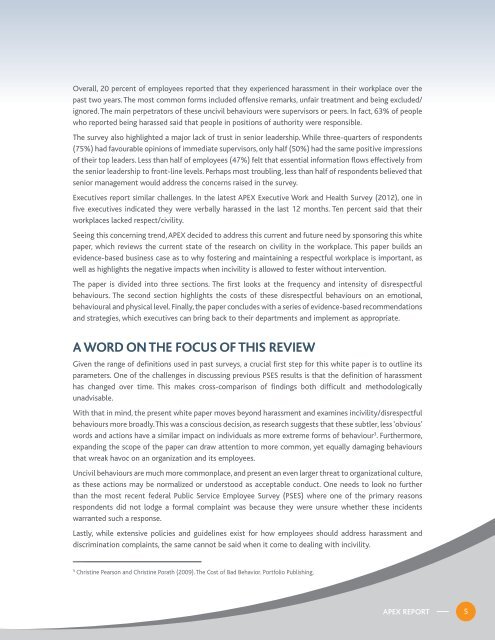CIVILITY MATTERS!
civility report - eng
civility report - eng
You also want an ePaper? Increase the reach of your titles
YUMPU automatically turns print PDFs into web optimized ePapers that Google loves.
Overall, 20 percent of employees reported that they experienced harassment in their workplace over the<br />
past two years. The most common forms included offensive remarks, unfair treatment and being excluded/<br />
ignored. The main perpetrators of these uncivil behaviours were supervisors or peers. In fact, 63% of people<br />
who reported being harassed said that people in positions of authority were responsible.<br />
The survey also highlighted a major lack of trust in senior leadership. While three-quarters of respondents<br />
(75%) had favourable opinions of immediate supervisors, only half (50%) had the same positive impressions<br />
of their top leaders. Less than half of employees (47%) felt that essential information flows effectively from<br />
the senior leadership to front-line levels. Perhaps most troubling, less than half of respondents believed that<br />
senior management would address the concerns raised in the survey.<br />
Executives report similar challenges. In the latest APEX Executive Work and Health Survey (2012), one in<br />
five executives indicated they were verbally harassed in the last 12 months. Ten percent said that their<br />
workplaces lacked respect/civility.<br />
Seeing this concerning trend, APEX decided to address this current and future need by sponsoring this white<br />
paper, which reviews the current state of the research on civility in the workplace. This paper builds an<br />
evidence-based business case as to why fostering and maintaining a respectful workplace is important, as<br />
well as highlights the negative impacts when incivility is allowed to fester without intervention.<br />
The paper is divided into three sections. The first looks at the frequency and intensity of disrespectful<br />
behaviours. The second section highlights the costs of these disrespectful behaviours on an emotional,<br />
behavioural and physical level. Finally, the paper concludes with a series of evidence-based recommendations<br />
and strategies, which executives can bring back to their departments and implement as appropriate.<br />
A WORD ON THE FOCUS OF THIS REVIEW<br />
Given the range of definitions used in past surveys, a crucial first step for this white paper is to outline its<br />
parameters. One of the challenges in discussing previous PSES results is that the definition of harassment<br />
has changed over time. This makes cross-comparison of findings both difficult and methodologically<br />
unadvisable.<br />
With that in mind, the present white paper moves beyond harassment and examines incivility/disrespectful<br />
behaviours more broadly. This was a conscious decision, as research suggests that these subtler, less ‘obvious’<br />
words and actions have a similar impact on individuals as more extreme forms of behaviour 3 . Furthermore,<br />
expanding the scope of the paper can draw attention to more common, yet equally damaging behaviours<br />
that wreak havoc on an organization and its employees.<br />
Uncivil behaviours are much more commonplace, and present an even larger threat to organizational culture,<br />
as these actions may be normalized or understood as acceptable conduct. One needs to look no further<br />
than the most recent federal Public Service Employee Survey (PSES) where one of the primary reasons<br />
respondents did not lodge a formal complaint was because they were unsure whether these incidents<br />
warranted such a response.<br />
Lastly, while extensive policies and guidelines exist for how employees should address harassment and<br />
discrimination complaints, the same cannot be said when it come to dealing with incivility.<br />
3<br />
Christine Pearson and Christine Porath (2009). The Cost of Bad Behavior. Portfolio Publishing.<br />
APEX REPORT 5


